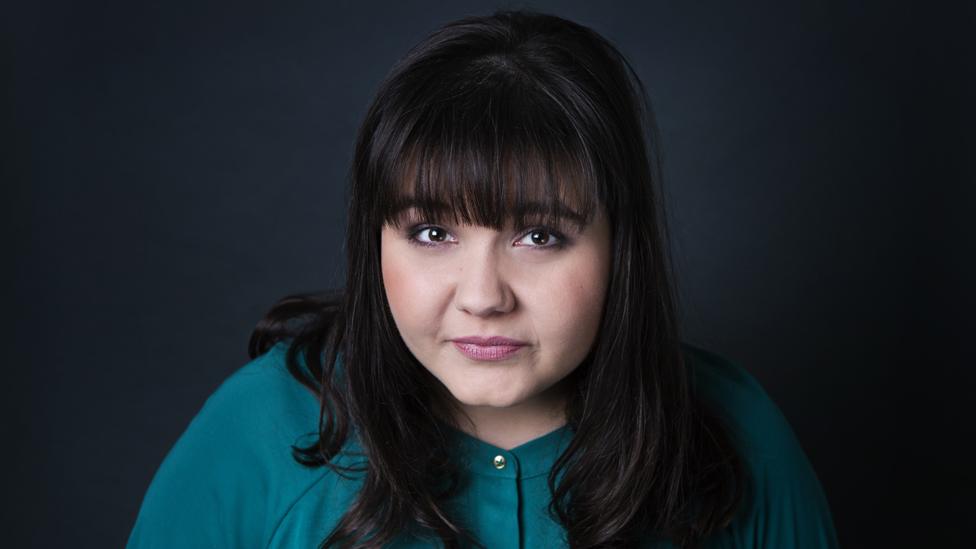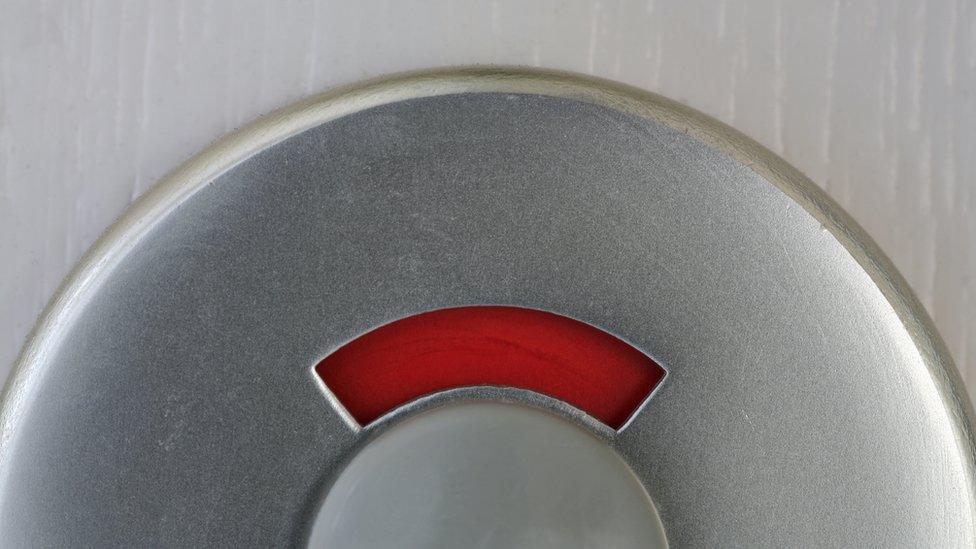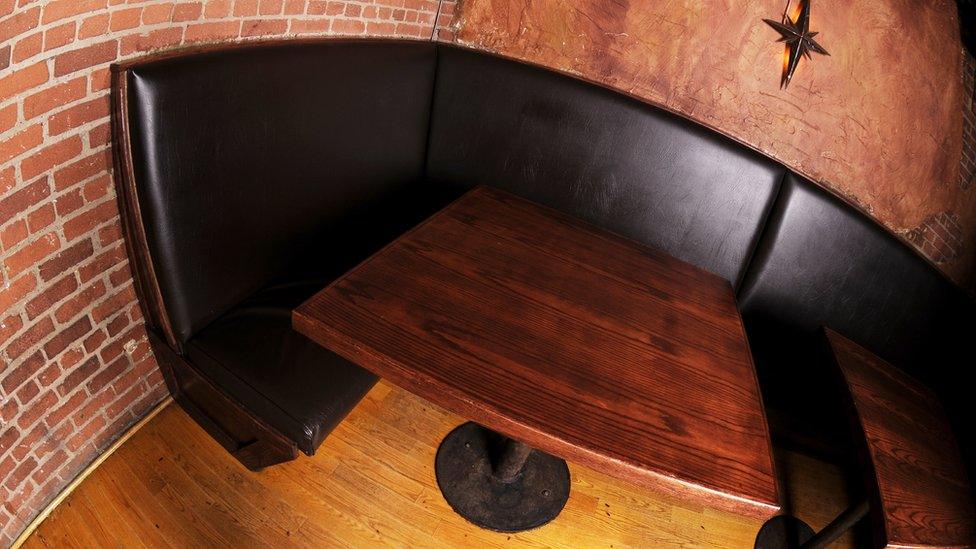Seeking sanctuary from social angst in the toilet
- Published

Comedian Sofie Hagen manages her social anxiety by retreating to the safety of closed-in spaces.
The first time I hid in a public bathroom, I was 14. I locked the door, closed the toilet seat, sat down, and waited until the angst passed.
The trigger was a handsome young boy called Magnus who wanted to kiss me as I had promised to be his girlfriend a week prior. I had never kissed a boy before and, even though I thought I wanted to, my whole body reacted differently. Suddenly I needed walls around me. As close as they possibly could come.
"You've been in there for almost an hour," our mutual friend Victor shouted into the girls' bathroom, "Magnus says that if you don't come out soon, he will break up with you."
"Let him!" I shouted back, and thus I lost my first ever boyfriend, but gained the friendship of public toilets, and hiding in them, when it all becomes too much.
Flash forward to now. "I would like a table for one in a corner," I said to a waiter at a restaurant in Leeds recently.
I had high hopes for this particular restaurant as their bathroom was perfect. It was on a totally different floor, far away from everything. No one else would be able to hear me breathe in there because the stalls are completely closed with no gap above or under the door.
Each stall had a decent lock and a good coat hook too. It was big enough for my butt to feel comfortable on the seat without half of it having to rest on the bin for Embarrassing Lady Stuff. And it was quiet - no music, no queue, no other people in there.
This was a five-star public bathroom and I spent a good 20 minutes in it, taking deep breaths (after flushing) while trying to get my head together. I had spent six hours straight among people that day, loud people in particular.

Twenty minutes later...
"Yes, of course," the waiter answered, and I was not surprised - I already knew. Based on their toilets alone, I knew that this must be one of the only social-angst-friendly restaurants in all of England. I followed him to a table that was - wait - in the middle of the room?
It's a table for one," he said, "but it's not in a corner." He laughed a bit and placed the menu on it. "Enjoy and let me know if you need anything."
"A table in a corner is what I need," I almost shouted. And maybe I would have, had I not been at a high level of social angst. Then again, had I not been at a high level of social angst, I would not have needed a table in a corner in the first place.
Corners are amazing in the same way that bathrooms are amazing. The more walls that are around you without including other people, the better. Instead I was placed right between two tables which both had dating couples on.
I remember that day as the day I learned to insist on corner tables. Those you ask will all look at you like you are weird for they are most likely people who do not care about corners and public bathrooms. They are people who go to parties and like it.
If I do go to a party, I will excuse myself at least once an hour to go somewhere and sit. I find a corner (oh, corners), a staircase or go outside and find a nearby alleyway. Then I take deep breaths. Fifteen minutes later, I feel I have to go back and put a smile on my face and pretend I am listening to conversations, but the chances are I'm focusing on not being in the way of people walking close to me or on how the voices around me seem to get louder and louder.
I do function. I have a job that my social anxiety rarely interferes with. I have friends, but I prefer to see them at their houses instead of at cafes.

As Patrick Swayze never said, anybody can put Baby in a corner...
If I have to put a name to these feelings, I use words like social angst.
To be fair, I am not sure of the technical term. Social anxiety, social angst, introversion - I've never had an official diagnosis. Instead I describe it like this - when there are too many people, or when people are loud and I have been among them for too long, I begin to dig my nails into my hand, I start sweating and then hyperventilating.
Google tells me it's the beginning of a panic attack, but Google also tells me that Magnus is now engaged to a model... so I prefer to not take everything Google says as fact.
It could, of course, be one of the other diagnoses I have been given through my life:
Lazy: "Come on, just because you don't want to get on the Tube at rush hour? Bad excuse."
Anti-social: "You never come to parties, how are you supposed to make friends?"
Weird: "Why are you sitting in a corner? People are dancing, come on!"
Boring: "You just have this dead demeanour around people."
Stupid: "You just said nothing and kept looking around the room, so we assumed you didn't know anything."
Or simply just arrogant: "You didn't say goodbye to anyone, you just left, like you thought you were better than all of us."
I have been called a diva many times. And I guess I could easily be, because, if I was ever to be famous, like Madonna-famous, my first demand would be that I always had a corner table ready for me wherever I go. And I would only dine in restaurants with social-angst-approved five-star public toilets. But most of all, I just want a table in a corner.

In The Mind - a series exploring mental health issues

Explained: What is mental health and where can I go for help?
Mood assessment: Could I be depressed?
In The Mind:, external BBC News special report (or follow "Mental health" tag in the BBC News app)

Sofie Hagen is winner of the Fosters Edinburgh Comedy Award Best Newcomer in 2015 and regularly refers to her mental health in her stand-up, podcasts and her newsletter. She is currently working on her next show for the 2016 Edinburgh Fringe which will again tackle difficult issues like mental health.
Follow BBC Ouch on Twitter, external and Facebook, external, and subscribe to the weekly podcast.